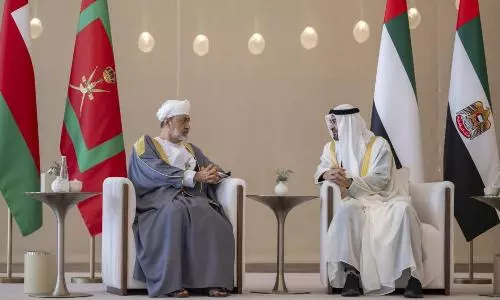
On the brink of strategic collapse
text_fields“The red alarm lights are blinking-the inter-state conflicts were never so high.” This was the warning delivered by Ambassador Wolfgang Ischinger, the chairman of the Munich Security Conference (MSC), held at Munich in Germany between 16th and 18th February 2018. ‘Neither Europe nor America seems to have any plan to address the threats facing them both and the world.’ But, there isn't much time left, he asserted. MSC is the world’s biggest annual security conference, created in the context of the cold-war in 1963. It has been, all these years, discussing the future prospects of European cooperation in world affairs. World’s most pressing security issues are discussed and debated by the world leaders, think tanks and military chiefs. This year, it was noted for the participation of 30 heads of states, 100 cabinet level ministers and expert delegates.
President of EU commission Jean Claude Juncker, British, French and Turkish prime ministers- Theresa May, Eduard Phillips and Bin Ali Yildrin, and German ministers of Foreign and Defence affairs Sigmer Gabriel and Ursula Von, U N secretary general Antonio Guetrres,and NATO secretary general Jean Stoltenberg were on the stage. Israel Prime Minister Netanyahu and the Emir of Qatar Sheikh Thameem Altani were also present.
Over the years, Munich Security Conference has become the world’s most important platform for shaping the security policy of the big powers. This year, the Syrian war, the possibility of cyber war, and the conflicts between Russia and the US were among the topics of discussion. Traditionally, the leaders could return home reassured with confidence. Now, those days seem to be over. Senior politicians of Europe were reluctant to sit together on a panel. Moreover, the delegates were leaving the hall while the discussions were gaining momentum. Difficult relations among the western countries were projected by reciprocal blame rather than diplomacy. American delegates didn't even show understanding for dissenting opinions. They seemed to be content with their military power.
Considering the broad spectrum of international issues, more than 100 institutions were invited for discussion, Rand Corporation, Chatham House, Atlantic Council, NATO, Royal United Services institute and so on. This gave an opportunity for participants to listen to various views and insights.
While the leaders were discussing the peace-initiatives, in eastern Ghouta in the suburbs of Damascus, the tempo of violence increased and hundreds of people -innocent children and women- were killed. Neither Russia nor Iran can relinquish its support for Assad. Syria was the only Arab country explicitly stood by Iran during the eight years (1980-88) of Iran- Iraq war. An implosion of the regime in Syria could facilitate the ascendance of an alliance of Sunni extremist groups that are anti-Shia, anti-Iran, and anti-Hezbullah. Syria is the corridor that connects Iran and Hezbullah. Hence the institutional stability in Syria is in the interests of Iran. On the other hand, Russia is the strongest ally of Bashar al-Assad, providing air-cover in the war. Soviet Union's first arms deal with a Middle Eastern government was with Syria in 1954. Russia got access to the Syrian port of Tartus since 1971 which at present functions as its naval base. America also wants the booties. General Alexander Venedictor, spokesman for the Russian Security Council, revealed the existence of the US military bases in the areas controlled by Syrian Democratic Forces (DSU), including two airbases at Tabaq, and Tanaf. Though the security council voted unanimously for a month-long cease-fire and a corridor is established to allow civilians to leave Ghouta, people do not leave as they are wary of revenge-killing.
Flurry of threats between Donald trump and Kim Jong-un caused much consternation. Fortunately, they were not followed by hostile actions. If war happens, it can cause tremendous disaster in South Korea and Japan which is not in the interest of Pentagon. However, it is heartening that Seoul and Pyongyang have joined hands to discuss the issues. But, MSC could not provide any legal framework to regulate the arms control. New players are entering the nuclear club and sharpening their arsenals.
The prominent American political scientist Ian Bremmer emphasised his concern about the possibility of cyber war. In a cyber war, the countries will lose their ability for counter attack. It will fail the electric grids, stop lights, make the machines erratic, the computers would go offline, people could be stuck in the dark subway tunnels, ATM would not give cash, all data in various government departments, banks, universities and companies will be destroyed. The internet that has brought many great advantages to our life has also made our life more vulnerable. According to Borge Brenda, President of the World Economic Forum, the cost of cyber war is just unbelievable.
MSC, in a nutshell, reflected the current political scenario in the world. The stand-off between Iran and Israel, Washington and Pyongyang, Iran and Saudi Arabia, and the US and Russia were evident. A relatively consolidated stand that the West presented traditionally was absent. It appears that the world moves jittery on the brink of strategic collapse.























